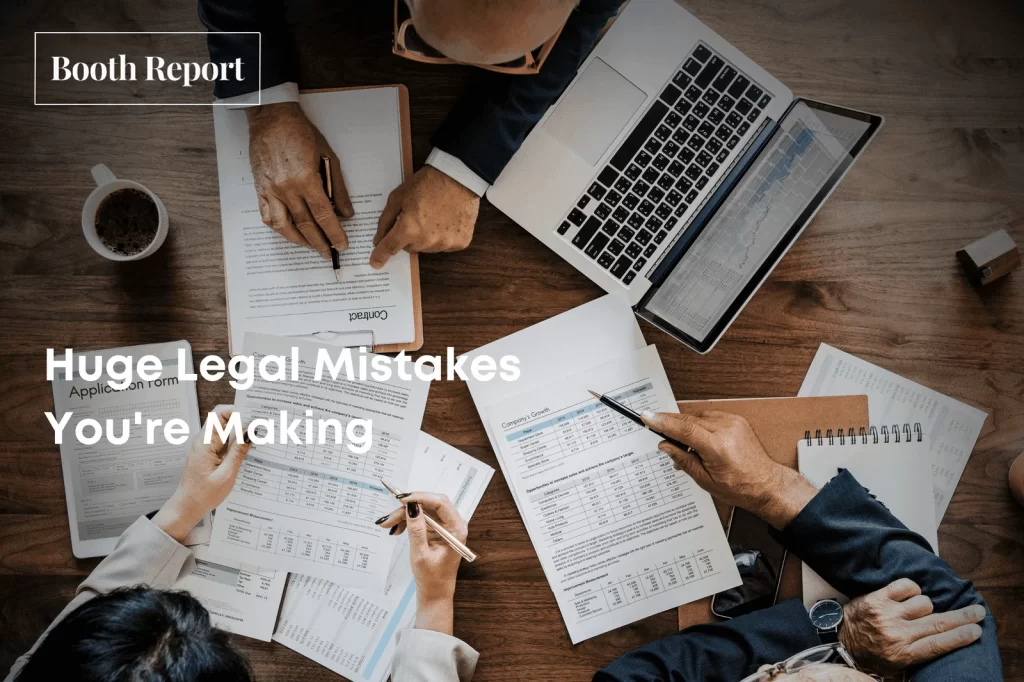Starting a photo booth business can be an exciting venture, blending creativity with entrepreneurship.
However, amidst the enthusiasm, it’s crucial not to overlook the legal aspects that can profoundly impact your business’s success.
In this article, we will delve deeper into the legal aspects of a photo booth business, shedding light on common mistakes and providing actionable solutions.
The Importance of Legal Clarity in Your Photo Booth Business
When stepping into the world of photo booth entrepreneurship, many are eager to jumpstart their operations, create fun and memorable experiences, and build a profitable venture.
However, understanding the legal terrain is equally vital. Legal clarity not only protects your business but also enhances its credibility, reassuring both clients and partners. Let’s examine the critical legal aspects to focus on for a thriving photo booth business.
Contracts and Agreements: Ensuring Solid Foundations
A sturdy legal foundation begins with well-crafted contracts and agreements. Your contracts should be clear, comprehensive, and tailored to the unique aspects of your photo booth business.
Vague or ambiguous contracts can lead to disputes and legal headaches. As mentioned in the provided transcript, a force majeure clause is a crucial element to consider, specifying unforeseeable events that could excuse performance.
For instance, if your photo booth event is hindered by extreme weather conditions, a well-defined force majeure clause can protect you from liabilities and obligations that were impossible to fulfill due to these unforeseen circumstances. It’s about foreseeing potential roadblocks and planning for them legally.
Deposit Policies: Striking a Balance
Deposit policies are a common point of contention. As mentioned earlier, non-refundable deposits are generally acceptable and protect your business from cancellations.
However, specific states may have regulations that require refunding under certain circumstances. It’s imperative to tailor your deposit policies while adhering to your state’s laws.
For example, if a client cancels within a specific timeframe or due to unavoidable circumstances like a documented medical emergency, it might be a legal obligation to refund the deposit.
Tailoring your deposit policy with clear terms and conditions is key to managing expectations and abiding by the law.
Employees vs. Independent Contractors: Navigating the Maze
The classification of your staff is a legal consideration that impacts taxes, insurance, and overall liability. The provided transcript touches on the Dynamex case and the ABC test, which has reshaped how California classifies employees and independent contractors.
Understanding these legal standards and ensuring compliance is crucial for your photo booth business.
If you hire attendants for your photo booth events, classifying them appropriately either as employees or independent contractors is essential.
It affects tax obligations, insurance, and potential legal liabilities. Adhering to legal guidelines and seeking professional advice can help you make the right classification.
Copyright Laws: Guarding Your Creativity
In the world of photography, copyright is king. As you design overlays and capture memorable moments, understanding copyright laws is paramount. Using copyrighted material without permission can land you in legal trouble.
To avoid this, create original content or obtain appropriate licenses for any third-party material you intend to use.
When crafting overlays or utilizing third-party designs, always ensure you have the proper licenses or permissions. Respect the intellectual property rights of others while safeguarding your creative work.
Understanding copyright laws is not just about legal compliance; it’s about fostering a culture of respect and integrity in the creative community.
Striking a Legal Balance in Your Photo Booth Business
Building a successful photo booth business requires a delicate balance between creativity and legality. Embrace the excitement of the photo booth industry while remaining diligent about the legal aspects.
Craft solid contracts, educate yourself about the law, and adapt to changes to ensure your venture is legally sound and prosperous.
In conclusion, running a photo booth business is a blend of creativity and legality. By focusing on crucial legal aspects such as contracts, deposit policies, employee classification, and copyright laws, you’re setting your business up for success.
Stay informed, consult legal experts when needed, and enjoy the journey of creating lasting memories through your photo booth business.
Navigating Intellectual Property: Copyright for Creatives
In the photo booth business, creativity is your forte. However, safeguarding that creativity is equally important. Copyright laws provide the legal framework to protect your original works.
When you create unique overlays, templates, or other assets, you automatically have a copyright over them.
Consider this scenario: you’ve designed a set of stunning overlays exclusively for your photo booth business.
It’s essential to understand that these designs are your intellectual property, and others cannot use them without your permission. Registering your copyright further solidifies your rights and allows you to take legal action in case of infringement.
Data Privacy and Security: Respecting Your Clients’ Information
In today’s digital age, data privacy is a critical concern. As a photo booth business, you may collect client data for various purposes, from sending event photos to managing bookings. It’s your responsibility to ensure that this data is handled securely and ethically.
Craft a clear and transparent privacy policy that outlines how you collect, use, and store data. Assure your clients that their information will not be shared with third parties without consent.
Implement robust security measures to protect this data from unauthorized access. Compliance with data privacy laws is not just about legal adherence; it’s about building trust with your clients.
Taxation and Financial Compliance: Staying in the Green Zone
Taxes and financial compliance are non-negotiable in any business, including a photo booth venture. Keeping accurate financial records, understanding tax obligations, and meeting deadlines are fundamental legal requirements. Failure to comply can result in penalties or even legal action.
Consider consulting a tax professional or an accountant well-versed in the regulations specific to your business. They can guide you on tax deductions, filing procedures, and compliance with tax laws.
By ensuring your financial operations are legally sound, you lay a strong foundation for the growth and sustainability of your photo booth business.

Moving Forward with Legal Confidence
In the ever-evolving world of business, staying legally compliant is key to your photo booth business’s success.
Contracts, deposit policies, employee classification, copyright laws, intellectual property protection, data privacy, and financial compliance are all vital aspects that warrant your attention.
Educate yourself continuously, seek legal counsel when needed, and don’t shy away from investing time and resources into ensuring your business’s legal health. A legally robust photo booth business not only protects you from potential risks but also instills confidence in your clients, partners, and stakeholders.
Maintain this delicate balance between creativity and legality, and you’ll pave the way for a thriving photo booth business that leaves a lasting impression on everyone it touches.
Strive for Excellence and Compliance
Excellence in your photo booth business goes hand in hand with legal compliance. When you provide exceptional services while adhering to the law, you create a solid brand image and a loyal customer base. It’s about more than just following rules—it’s about setting a high standard of professionalism.
Maintain open communication with your clients. Explain your terms, conditions, and contract clauses clearly.
A transparent approach builds trust and ensures that everyone is on the same page. Additionally, if any legal changes occur, promptly update your contracts and policies to reflect the new regulations.
Engage in Continuous Learning and Growth
Legalities can be intricate, and they may vary from location to location. It’s essential to commit to ongoing learning. Attend workshops, webinars, and seminars related to the legal aspects of running a business.
Engage with legal professionals who specialize in your industry. Their insights can be invaluable in guiding you through the legal maze.
Moreover, consider joining industry associations or networks that provide legal resources and updates. Collaborate with fellow photo booth entrepreneurs and share experiences. The more informed you are, the better equipped you’ll be to make sound legal decisions for your business.
Build Relationships with Legal Experts
Forming partnerships with legal professionals can be a game-changer. Establish a relationship with an attorney well-versed in business law or intellectual property.
They can review your contracts, provide legal advice, and guide you on compliance matters. Having a legal expert on your side offers peace of mind, knowing that you have a trusted resource to turn to in legal situations.

Conclusion: Building a Legal Foundation for Success
In the fast-paced and creative world of photo booth businesses, legality often takes a back seat. However, understanding that legal compliance is as vital as creativity can make all the difference. Embrace the legal aspects, learn about them, and implement them diligently.
Crafting robust contracts, being clear on deposit policies, understanding employee classifications, navigating copyright laws, respecting data privacy, and ensuring financial compliance form the crux of a legally secure photo booth business.
By following these practices, you not only safeguard your venture but also build trust with clients and partners.
Remember, a successful photo booth business isn’t just about capturing moments—it’s about building a sustainable, legally sound enterprise that flourishes and leaves a lasting mark on your industry.


